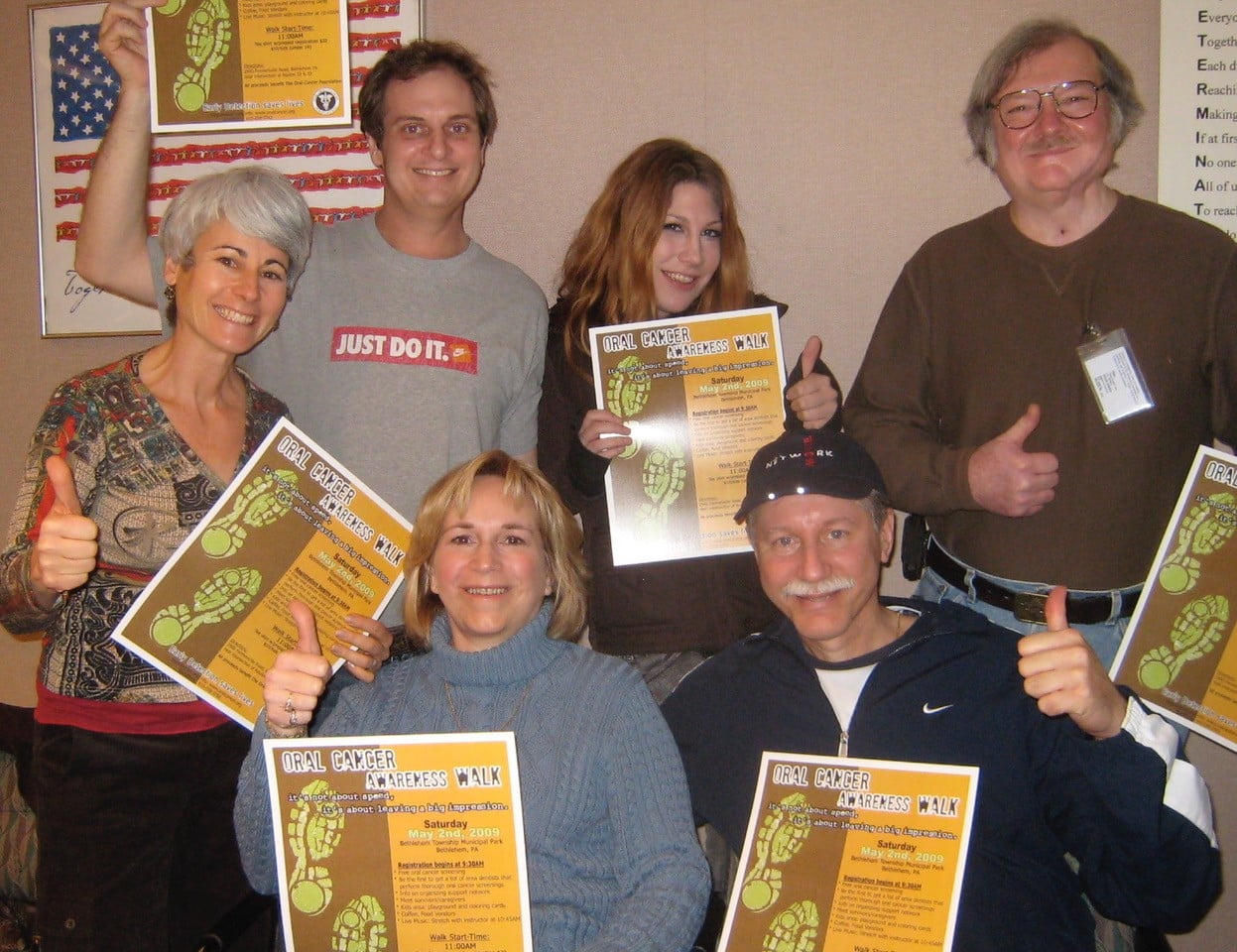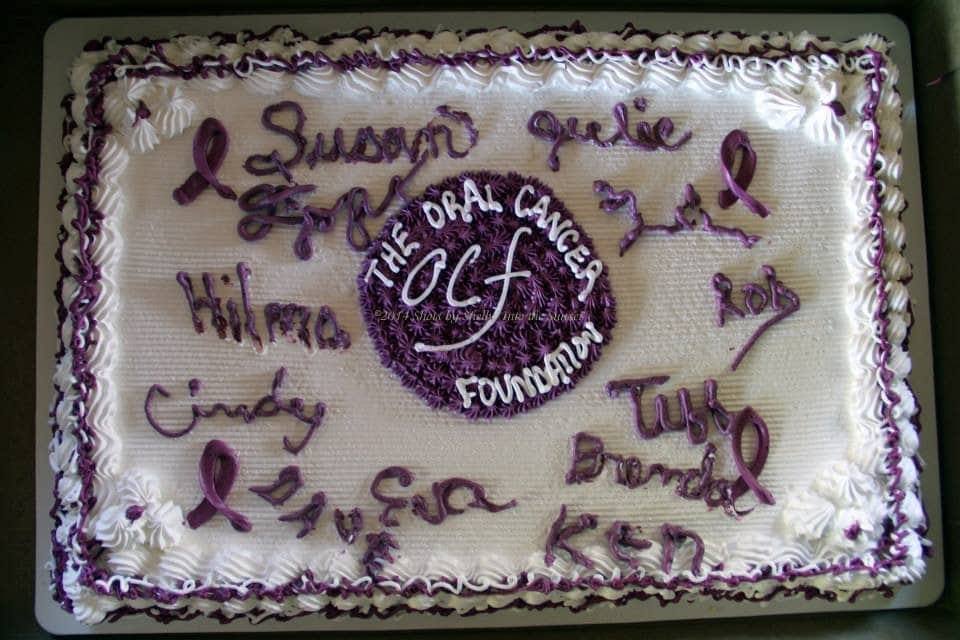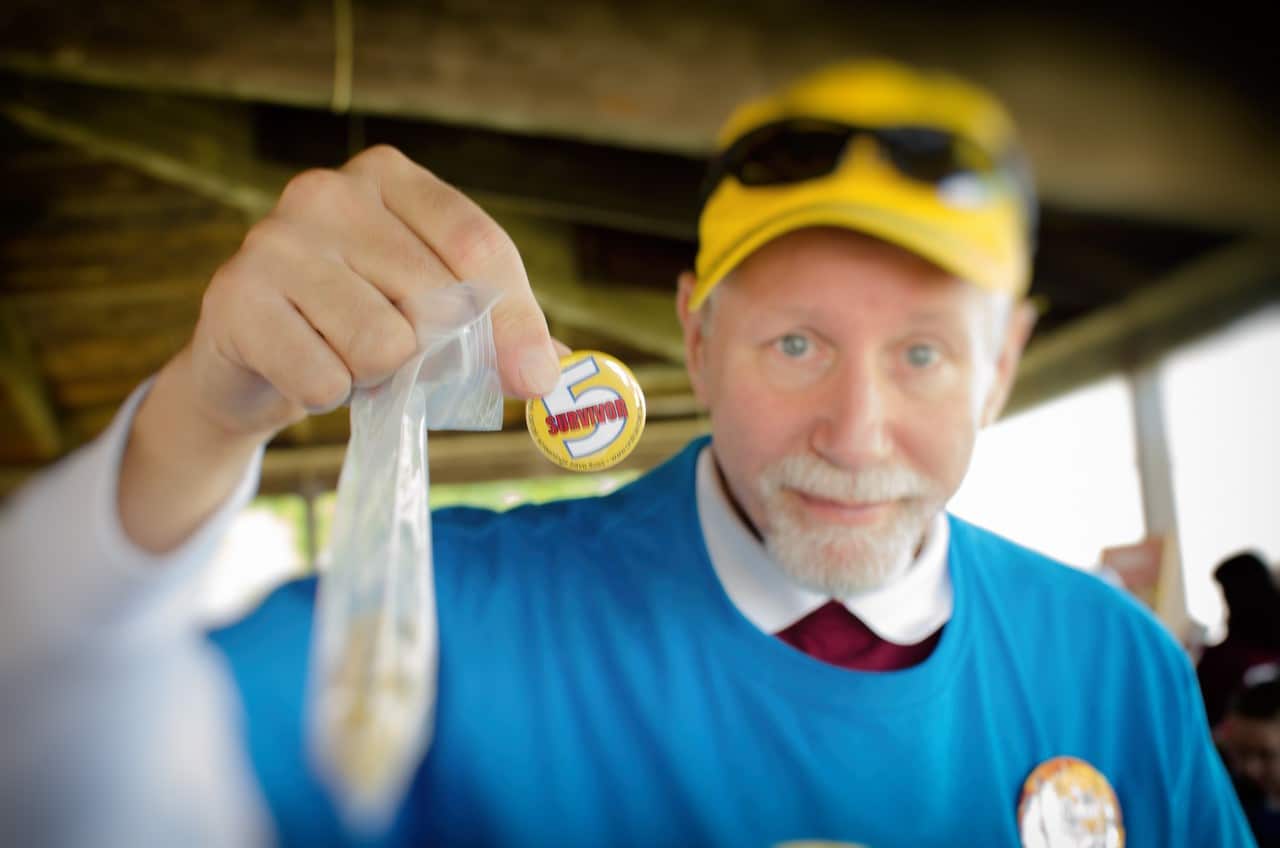Seven Walks and Forever Friendships
The Oral Cancer Foundation Walk for Awareness in Bethlehem, PA, became much more than a walk. At our monthly meetings, in addition to discussing the business of the walk, we celebrated birthdays, discussed ways to cope with treatment effects, and supported one another through personal struggles. Our walk lasted seven years, but the friendships survived almost two decades and still going strong.
It all began after I met the one and only Brian Hill after he gave a presentation on the east coast at an NYU dental school graduation. As a survivor myself, I was inspired to play a part in making a difference. Hosting an Oral Cancer Foundation Walk for Awareness seemed like a perfect way to give back, support an organization I cared about, and raise awareness in my community.
I broached the idea of working with two local oral cancer survivors and two hygienists. Intimately understanding the effects of this disease, everyone felt compelled and eager to play a part in making a difference.
With all of us working full-time jobs, simplicity was our motto. A $50 permit was required to secure the date at a centrally-located public park. We hustled to obtain three event sponsors, hang 20 posters advertising the walk, and gather five raffle items. Two local supermarkets donated bananas, apples, chips, and water bottles. On the day of the walk, we each had a manageable job: registration, raffle, set-up, signage, the screening, and the MC, which was my forte.
Mostly friends and family attended the first year. At registration, everyone was given a name tag and a sticker that read: ‘Walking In Honor Of’ or ‘Walking In Memory Of.’ These stickers promoted dialogue among us, as did the survivor buttons, displaying the number of years one survived the disease. David Eiskowitz proudly wore two ’10’ buttons and one ‘2’ button, the longest living survivor among us.
After the walk, we gathered for the raffle and heard several survivor stories, which was the most impactful and memorable part of every event. A dental hygiene student told the story of her grandma, who came to her for a cleaning at the school, where she noticed a suspicious lesion. Ken shared how he was a 911 responder and developed a mouth sore a few months later. Ed said he always thought he had bad breath and gargled far back in his throat with a mouthwash containing alcohol several times a day for two decades, and maybe the alcohol contributed to his diagnosis. The survivors ranged from 26-79. Everyone’s story had a common thread: surprise, fear, courage, and resilience. The messages resonated with one and all.
As we said goodbye to the attendees two hours later, everyone said, ‘At my next dental appointment, I’m gonna be sure they do an oral cancer screening!” A few people asked about getting involved. The following year, our core committee grew by three more dedicated people, one of which was Eileen, who lost her 26-year-old daughter Melissa to the disease. We would count on her husband, son, and older daughter to help set up and clean up for years.
The second year went more smoothly. Registration included a packed lunch donated by a local restaurant, and we had a cake honoring all of the survivors. Also, a local DJ volunteered. Registration doubled from the year before. And, we raised twice as much money for a cause we all cared about.
Our roles were so clear by the third year that it was more like throwing a family barbecue. Local dental professionals invited their staff and patients to join their team. Many more local businesses became regular sponsors, made raffle donations, and attended with family and friends. The ‘Memory Tree’ stood tall in a central location, plastered with burgundy ribbons, which you could buy for $1 to remember someone who passed from the disease. A local Temple Dental School student invited some classmates to join her in volunteering at the walk by educating us about flossing and brushing techniques using a dinosaur model. They were a hit with the kids.
In the fourth and fifth years, we hosted a free continuing education course on oral cancer for dental professionals at 8 AM, one hour before the 9 AM registration start time. The first course was given by an oral maxillofacial surgeon and the second by a dental oncologist. Our efforts to raise awareness were noticeable. We heard from patients about the thorough oral cancer screenings local dental professionals provided. Also, we heard stories of survivors being diagnosed early because they were educated and their dental professionals were experienced in recognizing the early signs and referring them to appropriate specialists promptly. After each walk, we celebrated our accomplishments, made a hoopla over the money we raised, and felt unified in our pride.
Our committee grew by a few more people, many of whom lived in the bigger nearby city of Allentown. There was a strong sentiment to move the walk to a larger venue like the local minor league baseball stadium. The cost to rent the space was significant. Also, it would require us to learn a whole new set-up which was stressful. The park was so easy and familiar that we opted to stay put. Some people were disgruntled and moved on, but the original core group remained intact and resolute.
After the 7th year, I moved out of state the following spring and announced my resignation as chair of the event. Among the core committee, one person dealt with significant health issues as a long-term treatment effect; another survivor passed on after a recurrence. One of the hygienists retired and moved closer to their grandchildren. Our core group was disbanding. A few dedicated attendees tried to get another walk going, but the 8th walk never happened. However, our efforts had longevity, as did the bond of our friendship. We still check in with one another, ask for advice about coping with dental complications, and fondly recall stories from working together on the walk.
We all continue to support OCF in other ways: a fundraising page, volunteering for other events, making donations (https://oralcancerfoundation.org/get-involved/donations/), informing others about OCF, and inviting new corporate sponsors. There is no other organization out there dedicated to changing the landscape from late diagnoses to early discovery like OCF. Up-to-date information on oral cancer can be seen first at https://oralcancerfoundation.org. Funds support prevention, education, research, and advocacy. and patient support activities.
Check out the upcoming walks here (https://oralcancerfoundation.org/ocf-walk-run-events/). If you don’t see a walk near you, get a couple of people together like I did, and host one yourself. The handbook OCF will give you was written by someone who has hosted over 20 walks. It includes all the forms and step-by-step information you need. Create some buzz, and people will attend! Roll up your sleeves, host a walk and make a forever difference. The survivor stories will leave you forever inspired; the friendships will leave you forever supported, and your community will be forever educated. Lives will be saved!
Eva Grayzel is a patient advocate for oral cancer awareness. Currently, she serves as a Patient Representative on the ASCO Head and Neck Cancer Guideline Advisory Group, a Patient Champion for the American Society of Clinical Pathology (ASCP), and a Correspondent-at-Large for the Oral Cancer Foundation. She has published 2 children’s books to promote dialogue and minimize fear around a cancer diagnosis in the family. https://www.evagrayzel.com @evagrayzel









